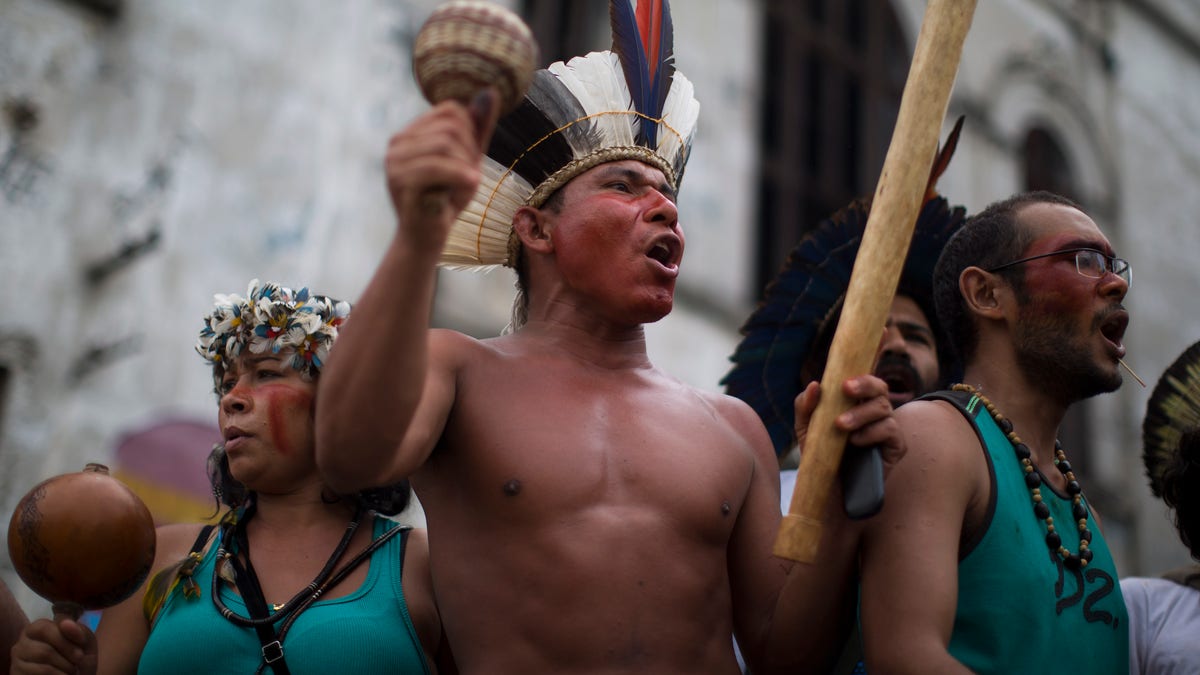
A group of indigenous people chants slogans on the grounds of an old Indian museum, in Rio de Janeiro, Brazil, Saturday, Jan. 12, 2013. (AP2013)
Rio de Janeiro – A tense standoff continues just outside the Maracana stadium in Rio de Janeiro after a failed attempt Saturday to evict a group of indigenous people living illegally in an old mansion nearby.
The legendary stadium is being refurbished to host the opening and closing ceremonies of the 2016 Olympics and the final match of the 2014 World Cup. Officials say it must be demolished as part of the work.
The public defender's office is criticizing the bid saying that the government cannot evict the group without a court order.
On Saturday, police in riot gear surrounded the settlement where indigenous people have been squatters for years on the site of an abandoned Indian museum. The confrontation lasted about 12 hours before the police dispersed late Saturday. They have not returned.
The indigenous group includes men and women of about 10 ethnicities — mostly Guarani, Pataxo, Kaingangue and Guajajara — who have been squatting for years in 10 homes they built on the site of an old Indian Museum, abandoned since 1977.
The police arrived early in Saturday morning and surrounded the compound. By noon, the residents locked the main gate. As supporters arrived, the Indians lowered a wooden ladder over the brick wall surrounding the complex to let them in, later pulling the ladder back up.
During the nerve-racking wait on Saturday, the squatters painted their faces and bodies and donned elaborate headdresses, at times playing rattles and flutes or whistling bird calls. Some displayed ornamental bows and arrows over the wall and through the gate separating them from the black-clad police in body armor.
The blighted streets around the stadium are to undergo a vast transformation to become a shopping and sports entertainment hub, complete with parking lots. Most of a favela, or shantytown, about 500 meters away has already been demolished to make way for the new development.
The governor of Rio de Janeiro, Sergio Cabral, said in a news conference in October that the building's razing is necessary for hosting the World Cup.
"The Indian Museum near the Maracana will be demolished," Cabral said then. "It's being demanded by FIFA and the World Cup Organizing Committee. Long live democracy, but the building has no historical value. We're going to tear it down."
However, a letter from FIFA's office in Brazil to the federal public defender's office published in the newspaper Jornal do Brazil said that the soccer authority "never requested the demolition of the old Indian Museum in Rio de Janeiro."
The indigenous have been resisting their possible eviction for months, operating with little or no information from authorities about what to expect, or what alternatives are available to them, said their leader Carlos Tukano.
The crumbling mansion with soaring ceilings that housed the old museum was donated by a wealthy Brazilian to the government in 1847 to serve as a center for the study of indigenous traditions.
After the museum closed more than three decades ago, Indians of various ethnicities started using it as a safe place to stay when they came to Rio to pursue an education, sell trinkets in the streets or get medical treatment.
The head of Rio state legislature's Human Rights Commission, representative Marcelo Freixo, called for the need to stay calm and avoid violence.
"Conflict here is not in anyone's interest," he said before addressing the squatters and supporters inside the compound. "If there is a judicial order, the police will have to enforce it, but we have avoid any injuries with dialogue."
Based on reporting by The Associated Press.
Follow us on twitter.com/foxnewslatino
Like us at facebook.com/foxnewslatino
